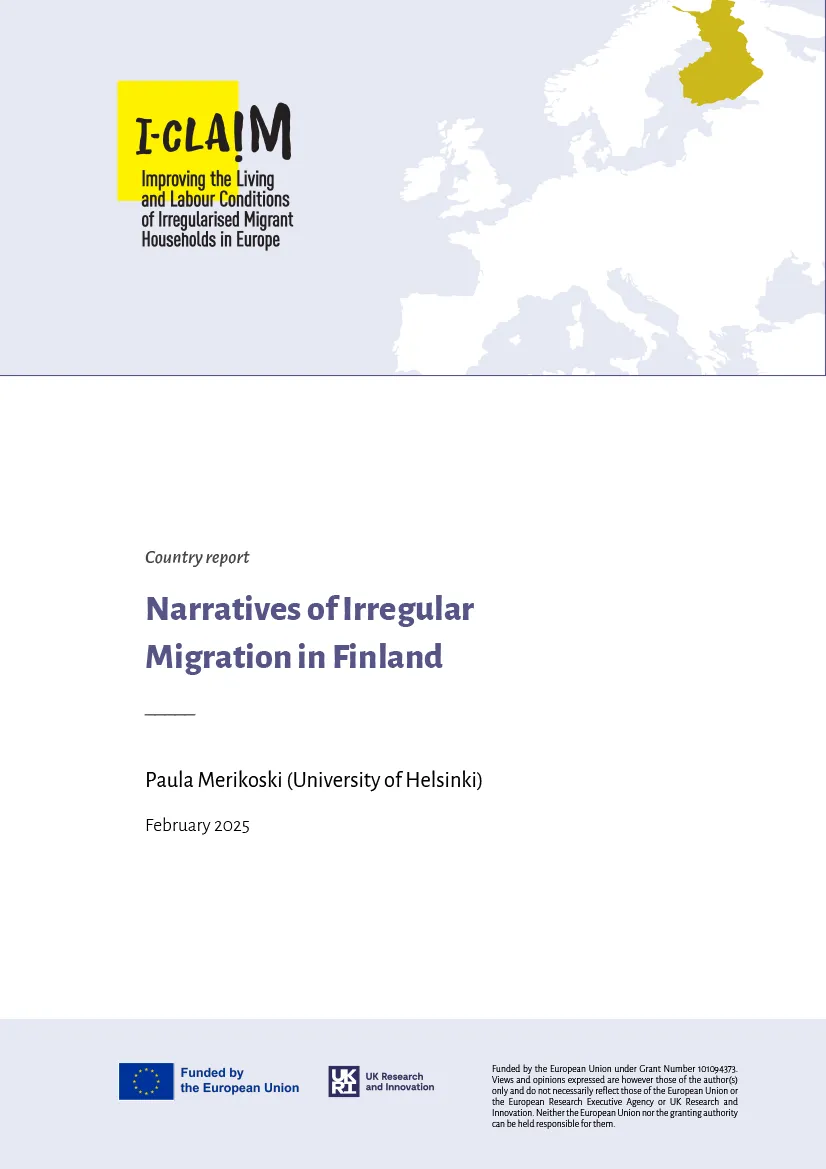Narratives of Irregular Migration in Finland
Paula Merikoski
How to cite:
Merikoski, P. (2025). Narratives of Irregular Migration in Finland. I-CLAIM.
Narratives of Irregular Migration in Finland
Paula Merikoski
This report presents the key findings of a corpus-based study on narratives of irregular migration in the domains of media, politics, and civil society in Finland. The data consists of text material from a five-year period (2019–2023) and includes news articles, parliamentary transcripts, ministry statements and the blogs and reports of civil society organisations. From this vast data, comprising more than 5,000 pieces of text, public narratives around irregular migration and migration-related debates are analysed. Corpus linguistics is used as a method of quantitative inquiry, followed by a qualitative reading of down-sampled texts.
Narratives are connected to questions of power. It is of crucial social concern who decides which topics are publicly discussed and debated and what kind of words and representations are used and by whom. Those who may influence discourses and terminology used in the media and the sociopolitical sphere have power over meaning (Rheindorf & Wodak 2018). Moreover, public discussion of different migrations is related to the way they are practically managed through legislation, administrative procedures, and bordering practices. In migration-related debates, constructions of “us and them” define some groups as outsiders from society as a community of value (Anderson 2013).
Our analysis revealed that the public narratives related to (irregular) migration in Finland revolve around the border crisis, on one hand, and the figure of the asylum seeker, on the other. While there are some discussions in the media and civil society about irregularised people and their rights, such discourses are relatively rare compared to discourses about asylum or work migration. However, in both the spheres of media and politics, the use of terminology is often incoherent. It is not uncommon to see terms such as refugee, asylum seeker, migrant and immigrant used interchangeably one article or speech. Moreover, people crossing borders are often described as an arriving faceless mass. This increases the challenge of analysing discourses about irregular migration, but it also reveals an important lack of coherence – and perhaps knowledge – in public migration discourse.
In the sphere of civil society, among organisations devoted to improving the rights and living conditions of precarious migrants, the use of terminology is accurate and the tone in which these issues are discussed is somewhat different to the other two societal domains. Civil society actors tend not to sensationalise or appeal to emotions and instead prefer to use reasoning founded on rights and law. The variety of texts in the media is wide, ranging from concise news pieces to longer, in-depth articles. In the latter, personal stories of individual migrants are often employed as a narrative tool, sometimes in a manner that invites reaction and debate. The shorter news pieces, on the contrary, typically overlook migrants as agential individuals and discuss them as the topic of a debate, law or event. The domain of politics includes a wider range of narratives and ways of discussing the topic, from fact-based and neutral to provocative and sensationalist.
None of the three corpora contains extensive discussion on irregular migrants as workers, aside from some articles where their vulnerability to exploitation is highlighted. In general, questions related to migrant work are often approached in a problem-centred tone, highlighting issues of illegality or exploitation. Moreover, in the politics corpus, discussion on the right of different migrant status groups to work is approached from the perspective of the Finnish state and different Finnish stakeholders, such as the agricultural sector. The topic of the debate concerns the potential benefit or cost to the Finnish state or stakeholders, and migrants’ views on the matter are almost completely overlooked. The Finnish word for undocumented, “paperless”, is most often encountered in relation to questions of access to health, welfare, and social services, and such people are treated more as the targets of welfare-state policies than as agents in their own right.
